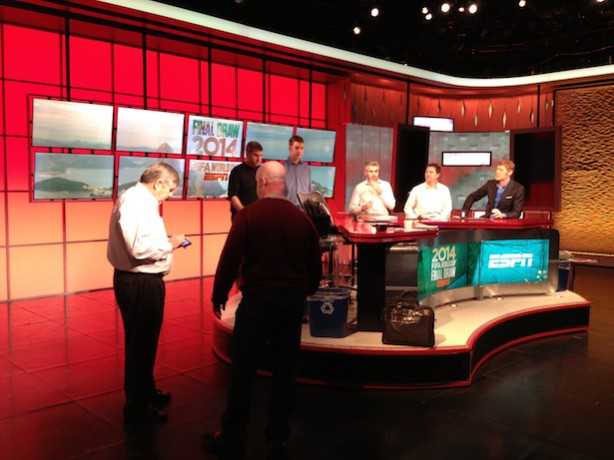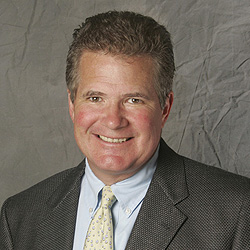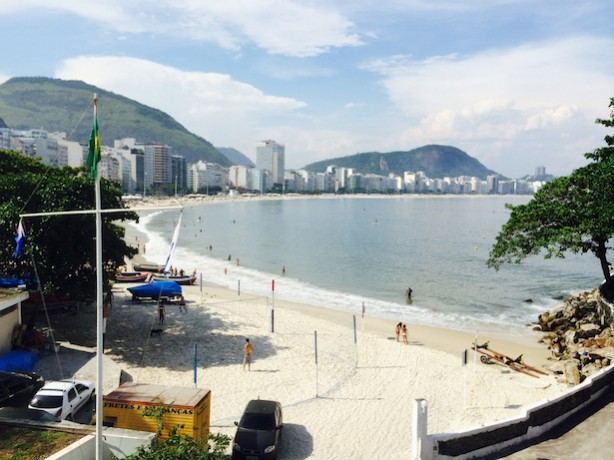On the eve of World Cup 2014 Draw, Sr. VP & Exec. Producer Jed Drake gears up for major undertaking


Reaction to ESPN’s presentation of the 2010 FIFA World Cup in South Africa was so positive that some fans consider it the finest work ESPN has produced in its 30-plus year history. Nearly four years later, ESPN is now tasked with the challenge of raising the bar even higher during next summer’s FIFA World Cup 2014 in Brazil.
While preparations started literally years ago, Friday’s FIFA World Cup Draw (11:30 a.m. ET, ESPN2 and WatchESPN) in Costa do Sauípe, Brazil is a significant day as the 32 teams will be placed into groups and the matchups for next summer’s tournament will be announced to the world.
Senior Vice President and Executive Producer Jed Drake spoke with Front Row about the World Cup Draw and his production team’s planning for 2014.
How does the Draw impact ESPN’s planning for FIFA World Cup 2014?
The Draw is our first program with the title “World Cup 2014.” We were obviously pleased with our coverage in 2010, but we all recognize that the challenge is to surpass our past effort on every level. The Draw is really an opportunity for us to pause briefly, produce a first-class program, and make darn sure we have the proper compass heading for the massive production that lies ahead.
What outcome would you most like to see from the Draw?
I’d like to see the U.S. team avoid ending up in the “Group of Death!” We would love to see them get out of the group stage – a place in the final eight would be extraordinary. But, in reality, the success of this project is not tied to Team USA. Our ratings held up very well even after the U.S. was eliminated in 2010. Honestly, I just cannot wait to see what great matches lie ahead in group stage, and to start projecting out into the knockout round. This 32-team field is exceptional. And the U.S. should be considered a very formidable opponent by anyone in this field.
So, by Friday night a group of us in Rio will be staring at white boards and computer screens, making a great many decisions in defining our overall coverage plan, now knowing who will play whom in the first 48 matches.
How is the ESPN production team approaching Brazil 2014 compared to South Africa?
We learned a great deal in South Africa, as you would expect. We started building on that knowledge almost immediately, and we have essentially been working on 2014 almost since the end of the last World Cup. Above everything else, we learned that our maniacal commitment to authentic coverage in every aspect of the production proved to be a very smart approach. The coverage on the pitch, the commentary in the booth, the discussions on the set, the thorough exploration of the African culture – it was all very real and authentic. We produced our coverage for the knowledgeable soccer fan first, knowing this was our core. And if we did it right, they would stick with us. Then, a spectacle known as the largest, most important sporting event broke out, and the casual viewer became engaged. . . and they did not let go. The same formula will be used again. The difference is that the casual viewer in our country now understands the significance of this event.
What are your impressions of the country’s preparations, both stadium construction and in terms of the infrastructure demands that go into hosting a World Cup?
Brazil is a big-time challenge. I’m on my seventh trip currently, and I grow to understand the culture more each time I’m here. Every country handles this huge event differently, but in the end it always seems to get done. That’s not blind faith, just my observations from being involved in this event for over 20 years. Remember, they were still paving the sidewalks at Soccer City in Johannesburg the day before the first match last time, but it all worked out. Am I concerned about the tragedy at the stadium in São Paulo last week? Of course, but if anything good can come out of that, it’s a massive call to arms that everything has to get done right, and that time is indeed running out.
I also note, we would not be anywhere close to where we are today with our own preparation were it not for the immense help we have received from German Hartenstein and his entire ESPN Brasil team. To work in Brazil on our own, with our level of ambition, it would have been impossible.
What are you most excited about looking ahead to 2014?
There’s really nothing like the World Cup. It’s a privilege and a great opportunity. Our success in 2010 has set up a very high expectation, understandably so. That’s our motivation. We need to make absolutely sure our coverage of the World Cup in 2014 is a total content and commercial success – and one that helps reinforce the fact the ESPN stands for something very special among all our viewers.
Note: An Argentinian World Cup Champion and one of ESPN Deportes’ most recognized soccer personalities, analyst Mario Kempes joins FIFA as a special guest of the Draw event on Friday. He’ll be one of the group of World Cup winners (from the eight nations who have won the 19 tournaments to date) who will draw the balls that define the group placing. Other players include Cafu, Cannavaro, Matthaus, Zidane and Sir Geoff Hurst.
— By Gabriela Nunez








